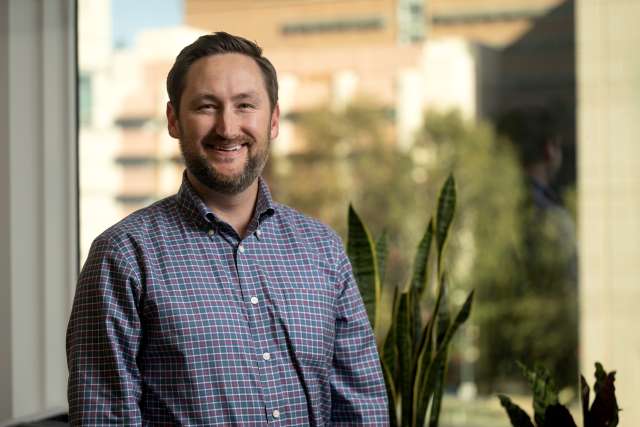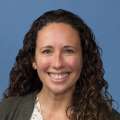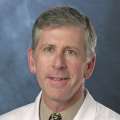As a freshman in high school, began accompanying his chronically ill father to doctor’s appointments.
Even as a teenager, Dr. Horton recognized that his family could have used more help navigating the physical and psychological challenges of his father’s diabetes-related kidney failure and, later, prostate cancer.
That experience is now helping to inform his work as a clinical instructor of psychiatry and palliative care at UCLA Health.
In his new assignment, which he started in October, Dr. Horton, 35, has dual roles. He is a psychiatrist embedded with the , a national model for providing integrative patient care for individuals and families dealing with cancer diagnoses. And he is a palliative care doctor working in the Ronald Reagan UCLA Medical Center and UCLA Santa Monica Medical Center.
His work includes instructing and mentoring fellow physicians, residents and medical students in how to help patients with serious illnesses feel more comfortable in body and mind as doctors treat them. Palliative care teams focus on improving quality of life for patients (and their families) by offering pain and symptom relief, treatment of psychological distress and help with choosing treatment options and coordinating communication among medical teams.
Meaningful work
Dr. Horton’s career path took twists and turns along the way, but he arguably has landed precisely where he should be.
He grew up in San Diego, where he attended a small, nurturing private school for students in kindergarten through 12th grade. The school focused on developing curious, lifelong learners. He surfed and hiked, ran cross-country and played soccer and golf.
At home, dinner-table conversations typically turned to his parents’ work in health care. His mother was a chemotherapy nurse at the Moores Cancer Center at UC San Diego Health. His father, who died four years ago, was a dentist who served in the Navy before a brief time in private practice. He spent the rest of his career working in the California prison system while maintaining a part-time role with the U.S. Navy Reserve.
“I was always struck by how meaningful their work was for them,” Dr. Horton recalled. “It’s not that I was set on becoming a physician, but I had a curiosity about meeting people in a time of need and hearing their stories.”
His mother was from Alabama, and his father, from Tennessee. They met while working at a hospital in Memphis. Their son headed to the South for college, earning his bachelor’s degree at Duke University in Durham, N.C. His studies included a semester in Prague and the Czech Republic.
After graduation, he returned to California and worked for four years at the Moores Cancer Center, where his mother had been a nurse. For the first two years, he worked in a drug discovery lab that was researching leukemia treatments.
“I loved the mission of bringing cutting-edge science to developing new medications and then testing them,” he said.
But he realized that he wanted to feel closer to the patient experience. He transitioned into a job as a clinical trial coordinator, helping with enrollment and data collection for doctors who were studying cancer in patients already living with HIV or AIDS. (He also volunteered as a foster youth advocate.)
Working with vulnerable patients with dual diagnoses felt profound. During this time, he occasionally joined the team of William Mitchell, MD, a palliative care physician and oncologist, on rounds. The experience was formative. Dr. Horton realized that he was eager to become a doctor.
“It was a team sport with a chaplain, a pharmacist, a social worker and a nurse practitioner,” said Dr. Horton. “The incredible amount of support and richness the team brought completely blew my mind. Their communications skills stood apart. They deftly used silence to leave room for people to explore and process the often overwhelming emotions that can come with dire diagnoses. I wanted to have those kinds of skills.”
In 2014, Dr. Horton began his studies at the and particularly relished a rotation in palliative care.
Two years later, , a UCLA Health psychiatry professor, referred him to colleague , a UCLA professor of clinical psychiatry and the inaugural holder of the Maddie Katz Chair in Palliative Care Research and Education. He encouraged Dr. Horton to explore the relatively new specialty of blending psychiatry and palliative care, while acknowledging that the strategy was far less traditional than the medical field’s typical siloed approach to care.
Psychiatry and palliative care
After earning his MD in 2018, Dr. Horton took Dr. Strouse’s guidance to heart. As a third-year psychiatry resident, he designed an elective experience to rotate with the palliative care team at Ronald Reagan UCLA Medical Center.
“Given my psychiatry training, longstanding personal and professional interest in the lived experience of illness and mentorship along the way, it clicked that I could build a career working in and potentially helping to define this new space between palliative care and psychiatry,” he said.
With his new position and Dr. Strouse’s ongoing mentoring, Dr. Horton appears to have arrived at the career sweet spot.
“I’m a psychiatrist wearing a second hat as a palliative care physician,” he said. “I work with patients with serious illnesses. They might have out-of-control pain. They also might have existential distress about dying or incredible depression or suicidal thinking or PTSD exacerbated by being in the hospital. It’s our job to elicit a really clear understanding of the patients and families and what their values are so that we can define goals for the care plan.
“We need more expertise at this interface to better understand and treat the unique needs of these patients,” Dr. Horton said. “I’m so grateful for UCLA’s forward-thinking investment in my training and position.”
The combo makes Dr. Horton part of a rare breed. Data compiled by the American Board of Psychiatry and Neurology suggests that as of 2020 fewer than 100 people had the combined training.
Colleagues at Simms/Mann appreciate the possibilities.
“We are very excited at Simms/Mann to be welcoming Dr. Horton to our team,” said , director of Simms/Mann. “He is a skilled psychiatrist who values whole-person care. In addition, his joint appointment between Simms/Mann and Palliative Care strengthens the partnership between our departments and will be an absolute benefit to our patients and families.”
Martha Groves is the author of this article.







